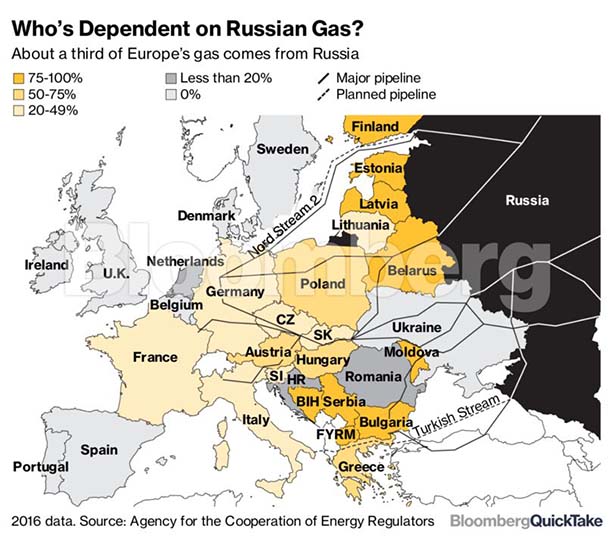Donald Trump upped his criticism of Germany on Wednesday as he threatened sanctions over Angela Merkel's continued support for a gas pipeline from Russia and warned that he could shift troops away from the NATO ally over its defense spending.
Echoing previous threats about German support for the Nord Stream 2 pipeline, Trump said he's looking at sanctions to block the project he's warned would leave Berlin “captive” to Moscow. The U.S. also hopes to export its own liquefied natural gas to Germany.
“We're protecting Germany from Russia, and Russia is getting billions and billions of dollars in money from Germany” for its gas, Trump told reporters at the White House during a meeting with Polish President Andrzej Duda.
The comments were the latest sign of how U.S.-German ties have eroded in recent years. The U.S. president has repeatedly rebuked Merkel's government over the pipeline project, trade policies, and defense spending. Germany, in turn, has criticized Trump's moves to abandon international agreements, including on climate change and Iran.
Though he didn't say which companies or governments could potentially face sanctions, Trump's comments about the pipeline generated a swift response from Moscow, which said the American president was engaging in “nothing other than blackmail and a form of unfair competition,” according to Kremlin spokesman Dmitry Peskov.
Merkel and Trump met most recently last week during anniversary celebrations of the 1944 D-Day invasion. That gathering came days after the European Union's (EU's) longest-serving leader took Trump to task at a commencement address at Harvard University, urging students to “tear down walls” and not to treat “lies as truth.” Without naming the U.S. leader, Merkel left little doubt as to whom she might mean to a crowd who cheered her on.
U.S. opposition to the gas pipeline is bipartisan, out of concern that Russia could use its supplies of natural gas to exert pressure on Western European nations dependent on the fuel. U.S. lawmakers also fear that with an added northern pipeline for its gas, Russia could more easily cut off fuel to Ukraine, which is now a key transit country to Europe.
“Germany is making a tremendous mistake” by relying on the pipeline from Russia, Trump said during a joint news conference with Duda.
Regardless of the political controversy, the Nord Stream 2 project has faced delays and may not be ready to transport gas until the second half of 2020, according to a report made public by Denmark's Energy Agency.
Nord Stream 2 organizers argue a new pipeline is needed to guarantee supplies will continue to flow in the coming decades as EU domestic reserves shrink and import needs rise. Opponents of the project say it hurts the bloc's cohesion and weakens its Energy Union strategy aimed at integrating the region's gas and power markets, diversifying energy supplies, and improving security.
Uniper SE, Engie SA, Royal Dutch Shell Plc, OMV AG, and BASF SE's Wintershall are European partners of Russia's Gazprom PJSC in financing the project to expand Nord Stream by 55 billion cubic meters a year. Russia supplies a third of Europe's gas and has no plans to give up its share to the expanding list of competitors from Norway to the United States.

Trump, speaking during the news conference Wednesday, said that Poland signed a contract to purchase an additional $8 billion of liquefied natural gas from U.S. companies, on top of $25 billion already under contract.
Trump said he'll meet with Russian President Vladimir Putin at the Group of 20 summit in Japan at the end of the month, though it's not clear the pipeline project will be on their agenda.
U.S. Energy Secretary Rick Perry said during a visit to Ukraine in May that he expected Congress to prepare legislation to sanction companies involved in the pipeline's construction.
Senators Ted Cruz, a Texas Republican, and Jeanne Shaheen, a New Hampshire Democrat, have drafted a bill that would target U.S. sanctions at vessels laying the pipeline and deny U.S. visas to executives from companies linked to the ships. The legislation would also block transactions in U.S.-based property or interests belonging to those individuals and would penalize entities that provide insurance to the project.
In the latest sign of Trump's frustration over German defense spending, the president said he's discussed sending as many as 2,000 more U.S. troops to Poland—and might take them from Germany since he believes Berlin isn't spending enough on defense as a partner in the North Atlantic Treaty Organization (NATO). There are more than 30,000 U.S. troops in Germany.
Under an agreement reached during the Obama administration, NATO members committed to spending 2 percent of GDP on defense by the mid-2020s, a level only seven nations were estimated to have reached in 2018.
“Germany's at 1 percent; they should be at 2 percent,” Trump said. According to NATO documents, Germany spent about 1.2 percent of GDP on defense in 2018.
The U.S. already has a few thousand troops in Poland as part of its role in NATO. Trump's move, if carried out, would add to that, but it wasn't clear whether the forces would be permanently based there or just rotated through.
© Touchpoint Markets, All Rights Reserved. Request academic re-use from www.copyright.com. All other uses, submit a request to [email protected]. For more inforrmation visit Asset & Logo Licensing.



